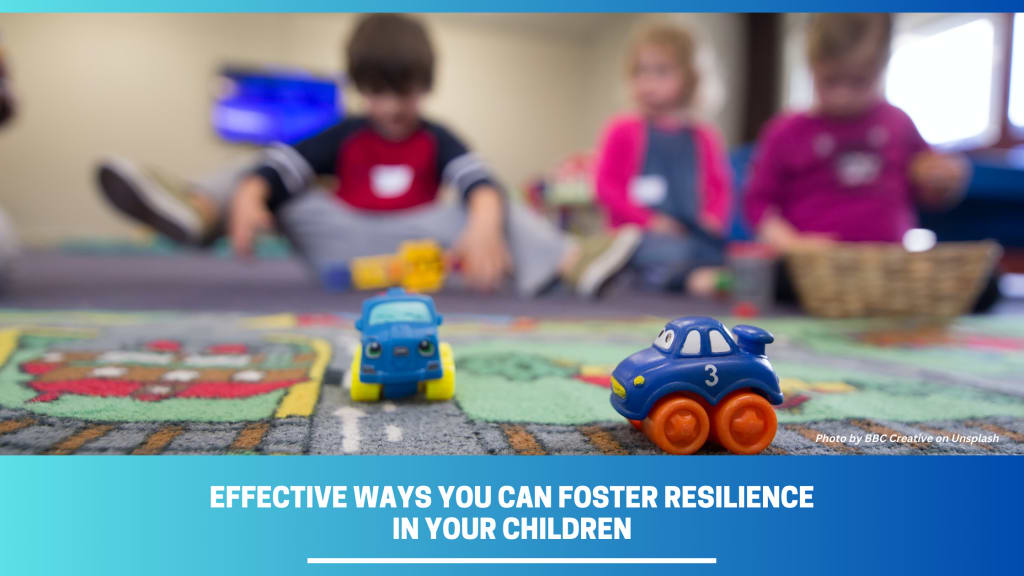Effective Ways You Can Foster Resilience In Your Children
Here are some effective ways to help your children develop resilience:

It can be difficult to respond to the question, "What should I do when my child is experiencing adversity?" It's not always clear what kinds of coping skills they require or how to best provide them with the help of teaching materials for preschool.
As a parent, you want your children to be resilient, or to be able to deal with whatever life throws at them and recover from setbacks. They will need that resilience to deal with the challenges of the future, whether they are job challenges, school problems, relationship difficulties, or even health issues. How do you help your child recover from a setback?
While you cannot control the challenges your children face, you can help them become stronger by ensuring they develop emotional management skills. Everyone faces difficulties, and how we deal with them determines our resilience. What we do to help our children overcome obstacles makes all the difference in their future happiness. Here are some effective ways to help your children develop resilience:
Trust their feelings
You must help your child understand that their feelings are real and that having a variety of them is normal. We often want our children to avoid sadness or anger, but they must learn to effectively manage those emotions. Instead of dismissing their emotions, acknowledge them. "I know you're disappointed, and I understand," he says. This can help your child understand that you accept and support their emotions.
It is also critical for them to understand that their feelings are not permanent. It will not last indefinitely. Your child may require some alone time to express or explore his feelings about a disappointment or other difficulty, but this does not imply that you do not love him as a person. Many children seek reassurance from their parents during a crisis, but don't be alarmed if your child appears stoic or quiet during this time.
Turn to each other
Children must learn that asking for help is acceptable. If they are feeling overwhelmed by their emotions, they must believe that they can reach out to you or another adult for help. You will most likely know how to help your child deal with an upset better than he does. It also helps to reassure them if you suggest some activities that might help them feel better. Say, "I understand how difficult this is. We could go for a walk and find a quiet spot to discuss what happened."
As you work through their emotions with them, they will realise you are on their side. Your child can learn to trust that you will support and love them even when things are difficult. This improves your relationship with your child, which is the foundation for resilience development.
Focus on the future
As children grow, they face a variety of challenges, including opportunities to deal with life changes. They must be given the opportunity to deal with any difficult situations that may arise. If they are frustrated or impatient, they must accept that life can be difficult. This is a normal part of growing up and learning to deal with problems. If your child is confronted with a difficult situation, he may require some time to process it on his own. But it's also important for him to understand that you're available to him whenever he needs you.
Have realistic expectations
Some parents have high expectations for their children, expecting them to excel in all aspects of their lives. If they don't always succeed, they may feel like a failure. Most children need to understand that everyone has good and bad days, and that learning from failure and preschool lesson planner can be beneficial. We also understand that there are some aspects of life over which we have no control, even as adults. The more your child understands that life is unpredictable, the better prepared he will be for any difficulties that may arise.
Set good examples
You can't change your children's upbringing, but you can set a good example as a parent and make sure they see it. Your children will learn to deal with challenges as you model resilience by remaining strong in the face of adversity. They will gain resilience and become more likely to succeed.
Final Thought
Any parent can take on the challenge of instilling resilience in their children. You don't have to be perfect, but by setting a good example, you can help them develop resilience and become future-ready. They will be able to face life's challenges knowing that they have someone to turn to when things get difficult. That kind of help is the most valuable gift you can give your child.
About the Creator
Amit Kumar
Full-time thinker & part-time writer...






Comments
There are no comments for this story
Be the first to respond and start the conversation.